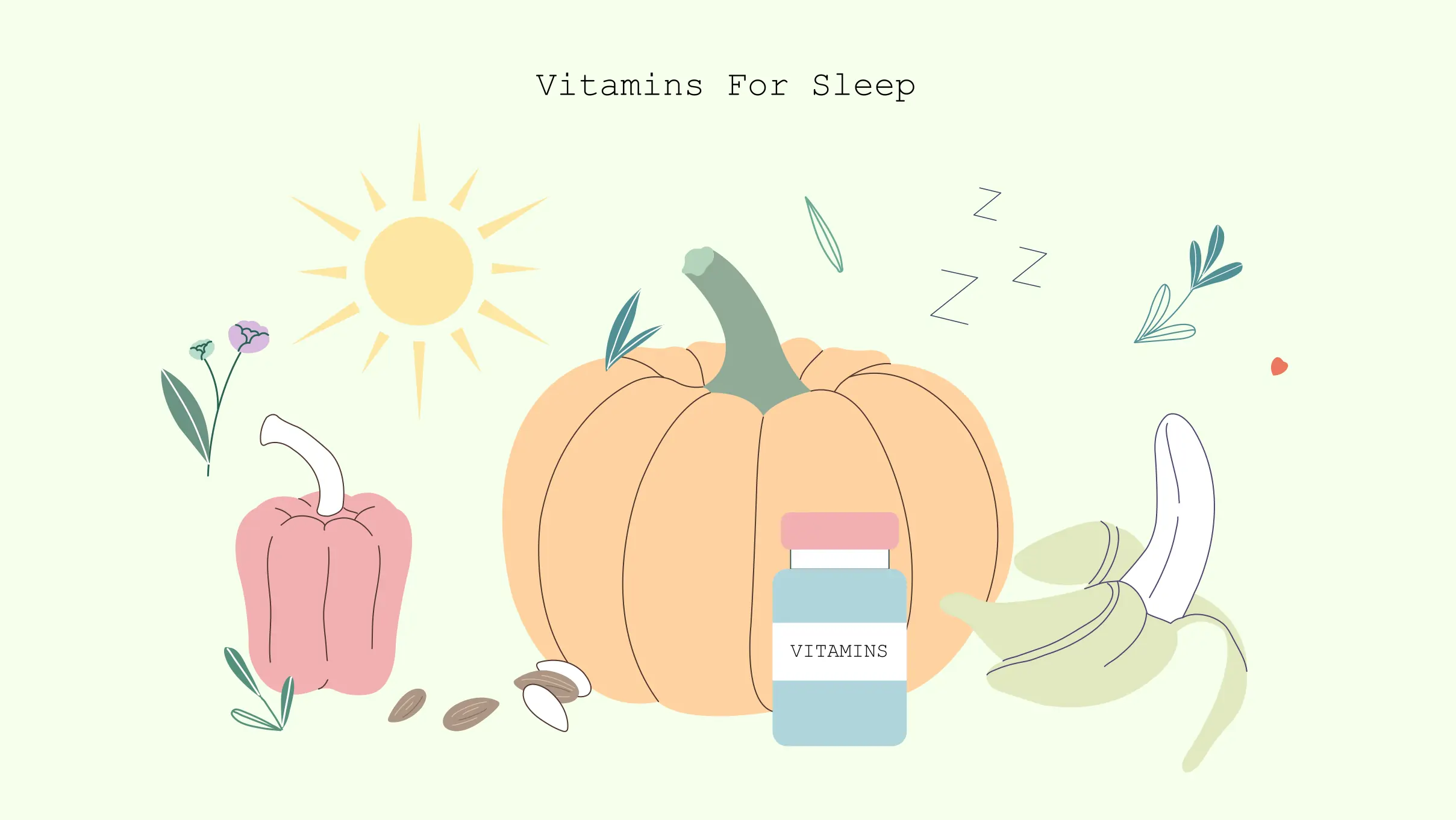Vitamins That Help You Sleep
Written by


We know the drill: A well-balanced meal, proper exercise, and sound sleep are paramount for good health.
However, while some individuals can transport themselves to dreamland as soon as their head touches the pillow, others struggle with it. The good news is that vitamins can restore your sleep cycle and ensure you enjoy high-quality sleep. They can act as a natural sleep aid and may also benefit your overall health. Furthermore, you can effortlessly increase the intake of these vitamins through diet. So, what are these crucial vitamins for sleep? Well, we bring you the complete cheat sheet to a good night’s shut-eye.
Magnesium
Magnesium is known to improve the symptoms of insomnia and can increase sleep time and efficiency. The vitamin for sleep can regulate the neurotransmitters associated with sleep. Usually, a balanced diet provides a daily dose of magnesium, which is 300 mg for men and 270 mg between the ages of 19 to 64. Some studies have shown magnesium supplements can help you fall asleep faster and enhance sleep quality. However, if you are considering supplements, you must consult your doctor. You can also include magnesium-rich foods in your everyday diet;
- Pumpkin seeds
- Almonds
- Spinach
- Cashews
- Soymilk
- Black beans
- Dark chocolate
- Peanut butter
- Potato
- Rice
Calcium
Calcium is essential for healthy teeth and bones. But, did you know this sleeping vitamin can also aid a good night’s rest? A study saw calcium to be associated with quality sleep. In fact, it was also found that the vitamin was able to help you fall asleep faster.
In another study, it was discovered that during our REM sleep cycle, the amount of calcium in our body was high and low levels of calcium could cause sleep disruptions. Men need 1,083 mg, and women over the age of 20 need 842 mg of calcium every day. Some of the popular calcium-rich foods include;
- Milk
- Yoghurt
- Cheese
- Figs
- Dark green leafy vegetables
- Soybean
- Black beans
Potassium
Potassium sleep supplements can be beneficial for peaceful shut-eye instead of sleeping pills. A study shows that potassium can substantially enhance actigraphic sleep efficiency. It further concludes that potassium supplements can indicate an improvement in sleep consolidation. The recommended potassium dosage for an average adult is 4,700 mg daily. Some foods with high potassium content include;
- Beans and lentils
- Avocado
- Coconut water
- Chicken
- Bananas
- Tomatoes
- Cashews and almonds
Vitamin D
Vitamin D is known for its role in maintaining bone health. However, it is also the best vitamin for sleep. Evidence shows that vitamin D is crucial for sleep regulation. And if you are suffering from vitamin D deficiency, it can put you at risk of sleep disorders, sleep difficulties, and more. Another reason why this is one of the best vitamins for better sleep is that vitamin D is associated with the production of melatonin, which is a sleep hormone that regulates the sleep-wake cycle. Some of the best sources of vitamin D are;
- Sunlight
- Oily fish, such as salmon and mackerel
- Liver
- Egg yolks
Vitamin E
Vitamin E is an essential fat-soluble compound that’s essential for vision, reproduction, brain health and more. Now, if you are wondering what vitamins are good for sleep? Well, vitamin E can help you here too. Vitamin E can prevent the ill effects sleep deprivation has on your short and long-term memory. And, it can also protect you from testosterone production from the issues that arise due to sleep deprivation. The recommended dose of vitamin E per day is 15mg. A few vitamins E-rich food sources are;
- Wheat germ oil
- Sunflower oil
- Almonds
- Peanuts
- Pumpkin
- Red bell peppers
Vitamin C
One of the powerful antioxidants is vitamin C. It is beneficial for your skin, heart, and more. But it is also one of the excellent vitamins for good sleep. Vitamin C has a positive effect on sleep deprivation-induced memory impairment. In one study, it was seen that people who slept for less than 6 hours were also the ones who consumed less vitamin C. Daily requirement is 90 mg for men and 75 mg for women. It is a supplement that’s taken in the morning and not a vitamin to take at night. Vitamin C-rich food sources are;
- Citrus fruits, such as oranges
- Peppers
- Strawberries
- Blackcurrant
- Potatoes
Vitamin B6
B vitamins for sleep are essential as they help in the synthesis of GABA, tryptophan and serotonin. These elements come together to ensure you enjoy a deep slumber. It is one of the wonderful vitamins for good sleep for adults as it is also helpful in assisting you to fall asleep faster and can reduce the number of times you awaken during the night. The recommended daily dose is 1.3 mg in a day. Foods rich in vitamin B6 are;
- Pork
- Poultry
- Fish
- Peanuts
- Wheat germ
- Oats
- Bananas
Vitamin B12
Finally, vitamin B12 is one of the best vitamins for better sleep. According to evidence, vitamin B12 has a positive effect on sleep patterns. In another study, vitamin B12 was administered in a patient suffering from free-running sleep-wake rhythm and in another patient who was going through delayed sleep phase syndrome. After taking 1.5 mg of vitamin B12, an improvement was seen in his disorder. The recommended dosage of vitamin B12 for people over the age of 14 is 2.4 mcg. Some of the rich sources of the vitamin are;
- Liver
- Clams
- Sardines
- Beef
- Nutritional yeast
Conclusion
While the vitamins for sleep mentioned above can be good for a peaceful slumber, it is essential to first consult a doctor before administering any medication. Because overdoing it can lead to side effects, and the right medication always depends on the condition you may be suffering from.
FAQs
Does B12 help you sleep?
Yes, vitamin B12 has been known to induce sleep and is also known to help people suffering from delayed sleep syndrome disorder.
What vitamin deficiency can cause insomnia?
Vitamin B12 deficiency is associated with insomnia, which is connected to insomnia.
Should B12 be taken at night?
No, vitamin B12 should be taken in the morning.
people like this article
Written by








